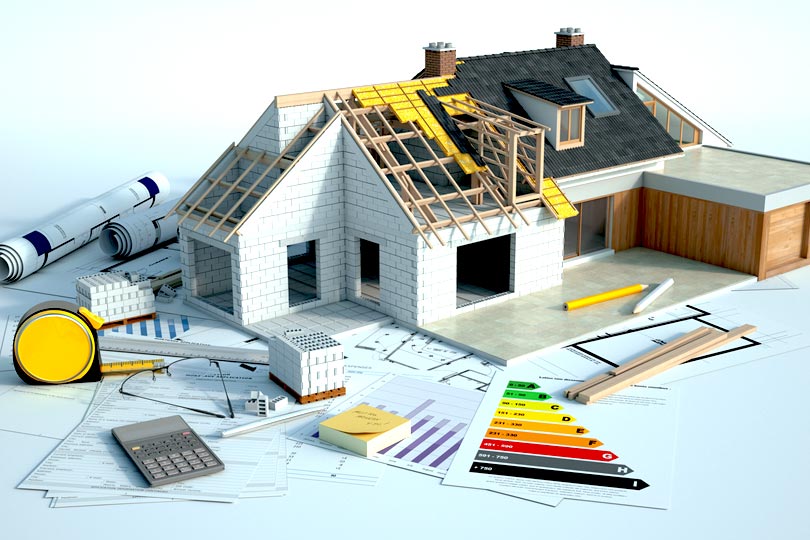Buying Versus Building: The Appraisal Process

How do construction loans differ from mortgages used to buy existing properties?
If you are just starting the journey toward home ownership, the main difference might seem to be the most obvious, but you can also expect differences in how the appraisal process works, the steps it takes to close the loan and even the interest rate.
Building Versus Buying: Appraisal Process For New Construction
When you commit to buying an existing home, you pay for an appraisal which must occur as a condition of loan approval. The appraiser notes any defective conditions that need repair, and other corrections may be needed, too.
For One-Time Close loans, the property hasn’t been built yet, so a compliance inspection is expected at the end of the construction process when the home might be ready for new owners.
But that does not mean construction loans don’t have an appraisal concern. Quite the opposite.
The “Subject To” Appraisal
When a builder funds the construction process, a “subject to” appraisal may occur during the initial mortgage loan underwriting. This process is similar when the borrower funds the project with a One-Time Close mortgage they apply for with a lender.
The “subject to” appraisal assigns value to the property, with the determining factor being what the home is worth after it is owned.
These appraisals may be good for as long as 180 days, depending on the mortgage (120 days is typical for many different loan programs), with the caveat that if the construction project is not completed on time, a new appraisal may be required.
The appraisal is not a compliance inspection; you may be required to have a compliance inspection of the new construction home once the work is finished, as you will typically be required to show that the home meets state/local building code.
Some sources note that a construction loan appraisal may take between two to four weeks, depending on circumstances, including how far the appraiser has to travel to do the work.
Like many other aspects of building a home from the ground up, it does not pay to be in a hurry to get this work done; give yourself enough time for the project to proceed as construction projects typically do, and expect delays along the way.
Want More Information About One-Time Close Loans?
We have extensively researched the FHA (Federal Housing Administration) and the VA (Department of Veterans Affairs) One-Time Close Construction loan programs.
We have spoken directly to licensed lenders that originate these residential loan types in most states, and each company has supplied us with the guidelines for their products. We can connect you with mortgage loan officers who work for lenders that know the product well and have consistently provided quality service.
If you are interested in being contacted by a licensed lender in your area, please send responses to the questions below. All information is treated confidentially.
OneTimeClose.com provides information and connects consumers to qualified One-Time Close lenders to raise awareness about this loan product and to help consumers receive higher-quality service.
We are not paid for endorsing or recommending the lenders or loan originators and do not otherwise benefit from doing so. Consumers should shop for mortgage services and compare their options before agreeing to proceed.
Please note that investor guidelines for the FHA and VA One-Time Close Construction Program only allow for single-family dwellings (1 unit) – and NOT for multi-family units (no duplexes, triplexes or fourplexes).
In addition, the following homes/building styles are not allowed under these programs: Kit Homes, Barndominiums, Log Cabin Homes, Shipping Container Homes, Stilt Homes, Solar (only) or Wind Powered (only) Homes.
Contact Us: Send Us Your Request – Spam Safe
Please send your email request to [email protected] which authorizes OneTimeClose.com to share your personal information with one mortgage lender licensed in your area to contact you.
1. Send your first and last name, e-mail address, and contact telephone number.
2. Tell us the city and state of the proposed property.
3. Tell us your and/or the Co-borrower’s credit profile: Excellent – (680+), Good - (640-679), Fair – (620-639), or Poor- (Below 620). 620 is the minimum qualifying credit score for this product.
4. Are you or your spouse (Co-borrower) eligible veterans? If either of you is an eligible veteran, down payments as low as $0 may be available up to the maximum amount your debt-to-income ratio per VA will allow – there are no maximum loan amounts as per VA guidelines.
Most VA lenders will go up to $1,500,000 and review higher loan amounts on a case-by-case basis. If not, the FHA down payment is 3.5% up to the maximum FHA lending limit for your county.
Do you know what's on your credit report?
Learn what your score means.

July 26, 2024The Federal Housing Administration (FHA) offers qualifying borrowers the option to build a home from the ground up using a Single Close FHA Construction Loan. This program, also known as a One-Time Close construction mortgage, allows borrowers to finance the construction of a new home and convert it into a permanent mortgage with just one closing, streamlining the often complex process of building a house.
July 19, 2024VA One-Time Close construction loans help qualifying veterans build homes they will own and occupy once the construction phase is complete. One-time close loans, or construction-to-permanent loans, combine construction and permanent financing into a single closing procedure. VA One-Time Close mortgages have no VA-required down payment or mortgage insurance, making them attractive options for qualifying borrowers.
July 12, 2024When planning a construction loan, you have many options. For example, do you want to buy land with a loan to build the house? Or do you already own a parcel suitable for the construction project? There are many other choices to make with home loans, but some don’t necessarily apply to construction mortgages.








